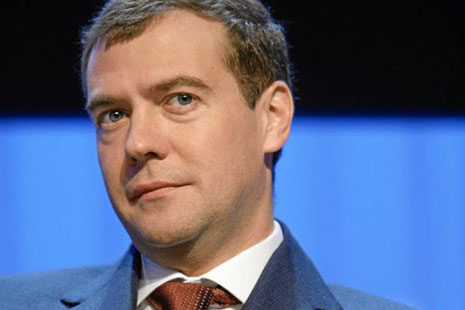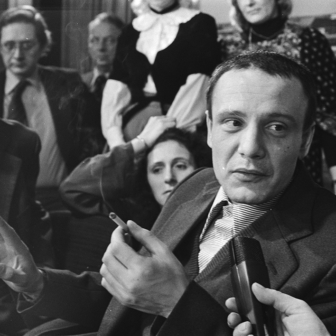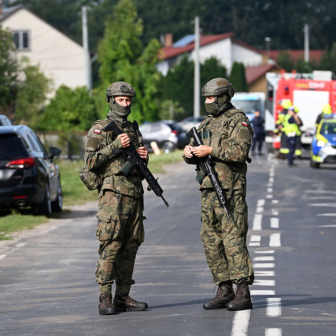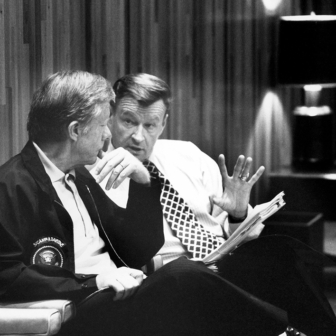RUSSIA’s parliamentary and presidential elections are scheduled for 4 December this year and 4 March next year respectively. Opinion polls suggest that ordinary Russians, habituated to expecting little from elections, don’t see themselves as having much say in these ones either. And the authorities have been even more assiduous than usual in seeking to ensure that voters don’t have much to be excited about. The most plausible opposition party, the People’s Freedom Party, was prevented from registering on a technicality, and prime minister Vladimir Putin has reached for an old Soviet bloc expedient – the All-Russian National Front, into which whole organisations have been press-ganged holus-bolus – to maximise the pro-government vote.
Most interest ly has turned on whether the relatively liberal and Western-friendly Dmitry Medvedev would again contest the presidency, or whether the senior partner in the so-called ruling duo or tandem, Vladimir Putin, would return to the office he occupied between 2000 and 2008. If Putin does return, it will be for a recently constitutionally revised term of six years rather than four, with the prospect of a further six years after elections in 2018. That could mean a quarter-century of de facto Putin rule in Russia.
Fearing this prospect, liberal figures within the regime have pushed vigorously for a second presidential term for Medvedev. Most Western governments would also have a clear preference for Medvedev rather than Putin. And Medvedev himself would like the job. But it appears that even the decision to stand is not his to make, as Medvedev himself has more or less acknowledged. Earlier this year, following the 8 per cent decline in GDP and other severe economic symptoms of the global financial crisis in Russia, and with popular dissatisfaction rising, the Medvedev camp seemed to be issuing a serious challenge to Putin’s paramount leadership. Medvedev made a series of critical statements about the existing direction of the government, and some of his prominent supporters went out on a limb to make strident demands for his re-election.
Then, in May, Medvedev called a press conference at Skolkovo – Russia’s would-be answer to Silicon Valley, which the computer-savvy president has been promoting – where many believed he would formally declare his intentions. But the event proved to be a fizzer. There was no announcement, and apart from a couple of sly digs at Putin (including a suggestion that no one should wish to be in power for twenty years), Medvedev again assumed the respectful protégé role that has been his usual posture since he first worked with Putin in the Petersburg city administration in the 1990s.
Although Medvedev is still making it known that he wants the presidency, or at least something nice in lieu, he seems to accept that he needs Putin’s support to get anything. Nearly four months on, he has still made no announcements, unilateral or otherwise. The rumour mill is again suggesting that an announcement on the presidency is imminent. But it’s far from clear that the decision about who stands for the job matters all that much.
Even in May, many Russian and foreign observers had become somewhat jaded by the drawn-out game of hide-and-seek the tandem couple had been playing over the presidency. Subsequent events were to make them more so. On the same day as the Skolkovo press conference, it was announced that the leader of the Kremlin-approved Just Russia party, Sergei Mironov, who had been increasingly stroppy and critical of the government in parliament, had been ousted. Putin has effectively eliminated all overtly oppositionist parties from the parliament, but the parties that are still allowed to get in, like Just Russia, sometimes take their role more seriously than was intended.
Just Russia seems likely to be eased out of parliament in the forthcoming elections. Mironov will be replaced as speaker of the Federation Council, the upper house of parliament, by a close Putin associate, former Petersburg governor Valentina Matviyenko, who is expected to ensure that greater decorum is observed in the chamber. For her part, Matviyenko had to be translated into the parliament by a series of deceptive by-election manoeuvres exceptional even by the standards of Putinist “managed democracy”.
The reason for these exertions was that she had become extremely unpopular in the home town she shares with most of the Putin leadership. St Petersburg is the fourth largest city in Europe, and the Kremlin is naturally very keen to secure the best possible election outcome there. To do so, it needed a more locally popular politician to head up the Petersburg campaign of the governing United Russia party. Matviyenko, a reliably loyal Putinist, could be of more use in charge of the slightly restive law-makers in the Federation Council.
Simultaneously, a great many other manipulations have been in progress in preparation for the polls. These broadly conform to the pattern of “political technology,” as it’s known in Russia, or “virtual politics,” to use the term coined by the distinguished British expert on the post-Soviet scene, Andrew Wilson. What these terms indicate is a determination by the authorities to ensure by any means that, with their popularity having ebbed somewhat, they get the kind of election results they want.
THIS is not to say that the Putin regime is deeply unpopular, or that it is unresponsive to signals of popular discontent. The authorities pay very close attention to the opinion polls and commission quite a few themselves. Even the more independent polls consistently show both Putin and Medvedev with the sort of ratings that would make Julia Gillard green with incredulous envy. (Medvedev’s results, though also very good, always seem to be slightly lower as if in deference to Putin’s, and lately have sagged slightly).
Russians expect less of their politicians than most Western voters do of theirs. But Putin in particular is seeking to please, with his recent macho displays including the remarkable dive in the Black Sea where he miraculously happened upon two ancient and extremely valuable Greek amphoras. Following on from last year’s Playmates-style calendar produced by student volunteers in support of Putin, a group of nubile young women known as Putin’s Army has recently recorded videos of its activities, in which by graphic example their members call on other young women to tear off their tops for Putin. On a more serious note, Putin has been at pains to identify himself as the main person responsible for the expenditure of large sums on defence, security and social welfare, all of which are very popular with key constituencies.
Not to be outdone, the Medvedev camp has come up with its own group of engagingly attired young women to organise happenings aimed at boosting Medvedev’s flagging fortunes. And Medvedev still makes some public statements aimed at rallying his troops. For the most part, though, his heart doesn’t seem to be in it, and Putin’s return to the presidency has been looking increasingly likely.
But the line-up at the top may yet be rearranged in surprising ways. Medvedev’s popularity has become an important asset for a Russian leadership keen for the moment to cultivate good relations with the wealthier and technologically more advanced countries. Even domestically, it has been suggested that if the ruling United Russia party nominates Medvedev as their candidate for the presidency at their congress on 23–24 September, it will draw in the liberal-reform constituency behind the party in time for the parliamentary polls in December.
So a return to the presidency by Medvedev with the true pecking order privately but clearly reinforced can’t be ruled out. Nor can a Medvedev prime ministership. But power does not reside in the prime ministership as a matter of course in Russia: many prime ministers since the fall of the Soviet Union have been minor figures, now forgotten or relegated to lesser roles. It has been a dominant position recently only because Putin has been occupying it.
Medvedev might be dropped to a dignified but much less prominent role as president of the Constitutional Court (not anywhere near as politically important as Australia’s High Court) or as chief executive of Skolkovo. But wherever he ends up, he is unlikely to be numero uno or even numero due. Under Putin, the latter position has been occupied and continues to be occupied, de facto, by Igor Sechin, an ex-KGB officer and old colleague of Putin’s, whose formal role is as deputy prime minister responsible for energy matters. “Energy diplomacy” – using Russia’s vast energy resources to exert geo-political pressure and influence on other countries, especially its near neighbours – is vital to Putin’s overall approach to foreign and strategic policy.
In one of his assertive interventions earlier this year, Medvedev issued a decree requiring senior government ministers and officials to withdraw from leading positions in large corporations. This forced Sechin to make what was seen by many as a humiliating retreat from his concurrent position as chief executive of Russia’s biggest oil corporation, Rosneft. Rosneft was formed largely from the dismembered Yukos corporation of the Russian businessman Mikhail Khodorkovsky, whose long prison term was recently extended further on the basis of unusually implausible charges. Medvedev has said publicly several times that Khodorkovsky presents no threat to the Russian state, implying that he could or should therefore be released. But he is still in jail. And when Rosneft and the US giant Exxon-Mobil recently struck what has been described as the biggest Russian energy contract with a Western company ever, it was Mr Putin and the ostensibly rusticated Rosneft chief executive Igor Sechin who presided, beaming, over the signing of the deal.
Among other things, the Exxon-Rosneft joint venture illustrates that Mr Putin is nothing if not pragmatic. For much of the time since his ascent to the presidency in 2000 he has displayed the strongly anti-Western instincts that his KGB past always led observers to expect. Since resuming his dominant position in the tandem more overtly this year, those anti-Western instincts have been on frequent display. Recently, for example, he referred to the United States as a parasite on the world economy. While Medvedev can also take a hard line sometimes when trying to impress the establishment with his readiness for high office (recently, for example, he called for Georgian president Mikheil Saakashvili to be placed before an criminal court), in recent months he has been increasingly drowned out by his senior partner.
Regardless of whether Medvedev gets a senior role in the new disposition Putin may well seek to maintain some of his younger protégé’s more Western-friendly approach to issues. And domestically he has in the past tinkered with economic reform and may do so again. He has retained very competent people in key economic portfolios and clearly respects their advice, despite the more liberal inclinations that some of them (finance minister and deputy PM Aleksei Kudrin, for example) occasionally display. Even with a fully dominant Putin back in the presidency, Russian domestic and external policies may not shift far – not least because the Medvedev camp’s efforts to tilt Russia in a more liberal direction didn’t achieve very much in the first place. •




